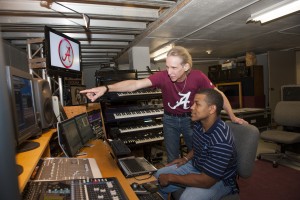The keyboardist with the famed rock group Steppenwolf, Michael Wilk, has brought his state-of-the-art recording studio to the College’s School of Music. Wilk wishes to give music students firsthand experiences in recording and film scoring using the most modern and sophisticated recording equipment available.
Last fall Wilk and Steppenwolf’s founder, John Kay, gave a multimedia performance on campus that highlighted some of Kay’s solo work as well as Steppenwolf favorites such as “Magic Carpet Ride.” The group now performs as John Kay and Steppenwolf. The performance was the result of Wilk meeting Charles “Skip” Snead, director of the School of Music, at an audition for Wilk’s daughter, Mandy, who is now studying music therapy at the Capstone.
After the successful performance and master class, Wilk and Snead continued to communicate about ways to continue their collaboration. He said he was “blown away” by the music program.

“I had really fallen in love with the music program, and Skip put an incredible amount of faith in me on this project sight unseen,” Wilk said.
At the time, Wilk was operating his recording studio in Oregon while touring with Kay. Wilk suggested moving his entire recording operation to Tuscaloosa, where he felt the equipment would get more use. Snead didn’t hesitate to take Wilk up on his offer so that music students could get hands-on experience in recording ensembles and film scores.
The new studio space is housed in the basement of the Frank M. Moody Music Building. Wilk has also volunteered his sound mixing expertise to the Million Dollar Band this fall. With one of this fall’s shows highlighting the music of Billy Joel, Wilk said he is delighted to work with the group to make their performances sound as good as possible. One technique he plans on using is to take an iPad hooked to his equipment to adjust the instrument levels from a distance so the prominent sound is the piano.
But this is just the beginning of the collaborations between Wilk and students and faculty in the College. He plans on bringing his expertise to the recording courses taught in the jazz studies program and has already been working with faculty members to develop ways that the studio can be used for teaching.
“The possibilities are endless,” Wilk said.